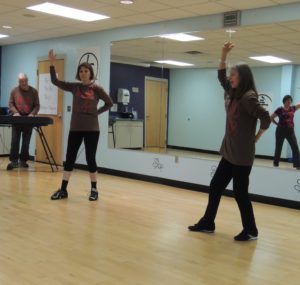Greene County was part of a worldwide salute to Taiji (also T’ai Chi and Qigong) Saturday. The Jefferson park and recreation department’s Taiji class, with instructor Joanna Hunter, demonstrated the Chinese health practice and meditation system as part of World Taiji and Qigong Day.

Beginning in Samoa, World Taiji Day spread time zone by time zone across the globe, with persons practicing Taiji at 10 am in their respective time zone, “sending a wave of calm and wellness around the world,” according to promotional information.
Hunter has taught Taiji at the Greene County Community Center for more than a year, and students in the class demonstrated three Taiji styles, starting with a classic move “Embrace Tiger, Return to Mountain.” The tiger symbolizes challenges in life, while the mountain symbolizes the place a person feels safe.
Hunter first started learning Taiji in 1989 as a way to deal with health challenges she was experiencing. “I found such great benefit that it became a passion,” she said.
She has learned from several master Taiji teachers, but her favorite style is based on the teaching of Chungliang Al Huang, with whom she has studied for more than two decades and also coordinated workshops which gathered students from around the world.
Hunter began teaching Taiji at the suggestion of friends who noticed that Taiji had made a difference in her life. She taught them, and has taught Taiji in a variety of settings and in several different states over the past 20 years.

Her husband Billy Sammons is an integral part of the Taiji experience as he improvises at a keyboard to add music that enhances the mood and power of each move. Sammons took many years of classical piano lessons as a child, studying with George Selbst, an internationally known classical pianist from Russia. He closely watches Hunter and her students as inspiration for the spontaneous musical creations he has called “an audiography of the experience.”
Hunter explains the various names – Tai’ Chi and Taiji – saying that Taiji is the preferred current transliteration of the Chinese name. Since it was first introduced in the States as T’ai Chi, that name is still very often used.
